Freedom of Speech
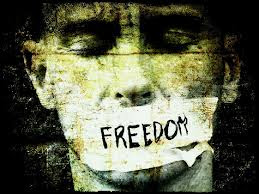
America has been heralded as a land where her citizens are free to speak their minds without fear of repression. This perception is more myth than reality. Understanding that the United States was formed as a Luciferian nation, the thoughtful saint will consider that Satan is not a champion of human freedom. Although both he and his disciples masquerade as messengers of truth and righteousness, Yahshua revealed the truth of Satan’s nature when He declared that he “comes only to kill, steal, and destroy.” If you get in the way of Satan’s agenda, all the vaunted freedoms of those societies he rules will flee away.
This has been true from the very beginning of America as a nation. The men who were proponents of rebellion against England were very intolerant of those colonists who were loyal to the King. The men who were in favor of rebellion never obtained a majority in the colonies, but they were able to carry forth their revolution by intimidating and silencing all opposition. Those loyal to the King of England, or neutral in their politics, had many valid reasons for not supporting the rebellion. The American Revolution, far from being a war against the British, was also a war against a large number of colonists from the thirteen states. John Adams stated in a letter to Thomas McKean that the Patriots had to struggle against approximately one third of the population. This by no means meant that two thirds were in favor of revolution, for a significant percentage of the population remained neutral.
In any struggle between men, it is common for the group in power to seek to silence the opposition. Free speech in times of conflict is very rare. The sinful nature of man does not overflow with patience and tolerance. Rather, it exhibits a tendency to violence and suppression of any dissenting opinions, no matter how legitimate or sincere the arguments.
The Patriots employed violent means to silence those among their fellow citizens who objected to their aims. Many who were loyal to the King were tarred and feathered. Others had their homes and businesses set on fire. Such tactics were commonplace during the years of the Revolution, and were quite effective. Loyalists ended up fleeing their homes, and relocating to lands under British control and protection. In areas under rebel control, Loyalists were subject to confiscation of property. Opposition press was silenced by threat of violence so that the only viewpoint being set forth among the people was that in favor of armed revolt.
In practice, freedom of speech was only available to those who agreed with the aims of the rebels in those territories which they held. Some may think that this situation changed once the war was ended and the American government was formed. After all, the First Amendment to the United States Constitution secures for all Americans the right to freely speak their minds. The First Amendment was adopted on December 15, 1791, and states:
Congress shall make no law respecting an establishment of religion, or prohibiting the free exercise thereof; or abridging the freedom of speech, or of the press; or the right of the people peaceably to assemble, and to petition the Government for a redress of grievances.
In practice, however, this Constitutional right has always had limits placed upon it, and has frequently been suspended. Just seven years after passage of the First Amendment, Congress passed the Alien and Sedition Acts.
In 1798, Congress, which contained several of the ratifiers of the First Amendment at the time, adopted the Alien and Sedition Acts. The laws prohibited the publication of “false, scandalous, and malicious writing or writings against the government of the United States, or either house of the Congress of the United States, or the President of the United States, with intent to defame … or to bring them … into contempt or disrepute; or to excite against them … hatred of the good people of the United States, or to stir up sedition within the United States, or to excite any unlawful combinations therein, for opposing or resisting any law of the United States, or any act of the President of the United States.”
[Source: http://en.wikipedia.org/wiki/Freedom_of_speech_in_the_United_States]
In 1798 war between America and France was looming, and members of Congress sought to silence those who wrote anything in defense of France, or critical of the policy of the United States. About 25 people were arrested under the Sedition Act, and ten of them convicted. One who was convicted was a grandson of Benjamin Franklin. Like his grandfather, Bache was a newspaper editor, overseeing a publication called the Aurora. In April 1798, Benjamin Franklin Bache was arrested when he referred to the president as “old, querulous, bald, blind, crippled, toothless Adams.”
The Sedition Act of July 14, 1798 included the following words:
That if any person shall write, print, utter, or publish, or shall cause or procure to be written, printed, uttered or published, or shall knowingly and willingly assist or aid in writing, printing, uttering or publishing any false, scandalous and malicious writing or writings against the government of the United States, or either house of the Congress of the United States, or the President of the United States, with intent to defame the said government, or either house of the said Congress, or the said President, or to bring them, or either of them, into contempt or disrepute; or to excite against them, or either or any of them, the hatred of the good people of the United States, or to excite any unlawful combinations therein, for opposing or resisting any law of the United States, or any act of the President of the United States, done in pursuance of any such law, or of the powers in him vested by the constitution of the United States, or to resist, oppose, or defeat any such law or act, or to aid, encourage or abet any hostile designs of any foreign nation against the United States, their people or government, then such person, being thereof convicted before any court of the United States having jurisdiction thereof, shall be punished by a fine not exceeding two thousand dollars, and by imprisonment not exceeding two years.
This law proved highly unpopular with the people. Thomas Jefferson was an outspoken critic of the Alien and Sedition Acts. In an upswelling of popular opposition to these acts, Thomas Jefferson was elected as President in 1800. Jefferson opposed the law on the grounds that it was unconstitutional, and upon his election he freed those who had been imprisoned for violations of this law.
Freedom of speech is a fundamental problem, serving as a great obstacle to any minority group of elite men who would seek to rule over a people. An aristocracy has always found free speech to be a bane to their continued rule. As I have been researching various sources for this series of writings I have paid much attention to a man by the name of Edward Bernays. Bernays was doubly a nephew of Sigmund Freud.
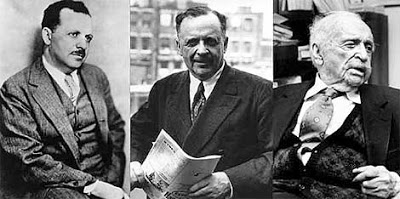
Edward Bernays – 1891-1995
Bernays is often called the father of public relations. Bernays preferred the word “propaganda,” but it had developed a negative stigma. Edward Bernays came from a wealthy family that had about a dozen servants. He was a member of an aristocratic elite. Bernays gave much thought to the means by which an aristocracy might maintain power in a democratic environment. He was unabashed in his advocacy of the elite using propaganda to control the masses through acts and words of deception. In his book titled Propaganda, published in 1928, Bernays wrote:
The conscious and intelligent manipulation of the organized habits and opinions of the masses is an important element in democratic society. Those who manipulate this unseen mechanism of society constitute an invisible government which is the true ruling power of our country.
We are governed, our minds molded, our tastes formed, our ideas suggested, largely by men we have never heard of. This is a logical result of the way in which democratic society is organized…
Whatever attitude one chooses toward this condition, it remains a fact that in almost every act of our daily lives, whether in the sphere of politics or business, in our social conduct or ethical thinking, we are dominated by the relatively small number of persons – a trifling fraction… who understand the mental processes and social patterns of the masses. It is they who pull the wires which control the public mind, who harness old social forces and contrive new ways to bind and guide the world.
It is not usually realized how necessary these invisible governors are to the orderly functioning of our group life. In theory, every citizen may vote for whom he pleases…
In theory, every citizen makes up his own mind on public questions and matters of private conduct. In practice, if all men had to study for themselves the abstruse economic, political, and ethical data involved in every question, they would find it impossible to come to a conclusion about anything. We have voluntarily agreed to let an invisible government sift the data and high-spot the outstanding issue so that our field of choice is narrowed to practical proportions. From our leaders and the media they use to reach the public, we accept the evidence and the demarcation of issues bearing upon public question…
Bernays was very much in agreement with Manly Hall’s premise that the ideal government was one of philosopher kings, a group of elite men who had the wisdom and understanding to govern. Just one page over from where the preceding quote was taken, Bernays states the following.
It might be better to have, instead of propaganda and special pleading, committees of wise men who would choose our rulers, dictate our conduct, private and public, and decide upon the best types of clothes for us to wear and the best kinds of food for us to eat. But we have chosen the opposite method, that of open competition.
[Source: Ibid]
Perhaps you are appalled, as I am, at the hubris of such statements. Bernays is not being insincere. He is setting forth what he believes to be a reasonable conclusion. Edward Bernays believed that the mass of men would be better off to have an elite group of “wise men” to dictate their conduct, both private and public. Bernays would certainly have considered himself to be among that cabal of wise men. He believed that he understood the group mind, as well as the dangers of granting the rabble any power to direct societal and world events.
I have come to understand that this is actually the mindset of a global elite who exist at this time, wealthy men and women of privilege who control world commerce, finance, and politics, and constitute an unseen government that guides the affairs of nations. These people sincerely believe that they are divinely appointed, and uniquely qualified, to make decisions for all of mankind.
It has always been necessary for a ruling elite to control public opinion. Bernays in the book Propaganda states:
Governments, whether they are monarchical, constitutional, democratic or communist, depend upon acquiescent public opinion for the success of their efforts and, in fact, government is government only by virtue of public acquiescence.
The Bible reveals that Satan and his disciples are intrinsically violent. He comes to “kill, steal, and destroy.” What the men of the American revolution could not achieve with guns and bullets, they accomplished by confiscating (stealing) the possessions of those opposed to them, or destroying their possessions and livelihood as they did in burning many homes and businesses to the ground. The Boston Tea Party was but the initial act of theft and destruction in the campaign to create a new Luciferian nation.
The Bible also describes Satan as “the great deceiver who deceives the whole world.” What we have experienced, particularly since the advent of radio and television, is a change in practice. Satan and his disciples must still control public opinion, but rather than do it through violent suppression, confiscation of goods, imprisonment, and even killing, they have pursued a policy of cunning deception poured out as a flood through the various media. Media ownership has been concentrated into the hands of a small group of corporations who inundate the population with a cunningly designed world view.
These two principle methods, violence and deception, have been utilized throughout America’s history to guide and direct the populace to perform the will of an elite. Freemasonry is itself a deceptive organization. The men of the Blue Lodges, those at the lower levels, are intentionally misled as to the true meaning of the various Masonic symbols and rites. Understanding that America was birthed by men under this Luciferian influence, would they reasonably have created a government that operates by a different principle? Is it not logical to conclude that deception would be an integral part of the government’s policy even as it is the policy of Freemasonry?
The historical evidence that free speech and thought has never actually been an aim of the government is overwhelming. I will cite a few pertinent examples. The actions of Congress to control the press through the Sedition Act of 1798 were mild when compared to the policy carried out by the administration of Abraham Lincoln during the Civil War.
A tremendous mythology has grown up around Lincoln. However, like so many other figures from American history, the true tale of this man’s character, motives, and actions has been deftly manipulated to serve the ends of those who find value in doing so. Even as public school students are not taught about the role Freemasonry played in the American Revolution, so too are a great many very important facts relating to the Lincoln Presidency passed over.
Abraham Lincoln was a shrewd politician. He understood the power of the press. During the Civil War he stated, “no man, whether he be private citizen or president of the United States, can successfully carry on a controversy with a great newspaper, and escape destruction, unless he owns a newspaper equally great, with a circulation in the same neighborhood.”
The largest ethnic group in America are Germans. There are approximately fifty million Americans of at least partial German ancestry in the United States today. This equates to 17% of the U.S. population. Lincoln came from the American Midwest where there was a particularly large concentration of Americans of German ancestry. At the time Lincoln was running for President it is estimated that there were 700,000 Germans living in the United States. Perceiving the need to influence the opinion of this large segment of the population, Lincoln purchased the German language newspaper Illinois Staatsanzeiger, press and all, in May of 1859. Lincoln manifested an awareness of the power of the press that was remarkable. He was not the backwood’s rail splitter that he is often characterized to be. He was a cunning trial lawyer who understood the nature of the political system.
Lincoln enlisted the aid of newspaper editors across the country to get his speeches, biography, and portrait published. There were some truly deceptive maneuvers used by Lincoln’s campaign managers to obtain the Republican nomination. Two men working for the Lincoln campaign, Ward Hill Lamon and Jesse Fell, ordered a local printer to create a large number of extra tickets for the Republican Convention. They distributed these counterfeit tickets among Lincoln’s supporters and told them to arrive early at the convention. When many of William H. Seward’s (the leading candidate’s) supporters arrived with legitimate tickets, they were turned away because the hall was already full.
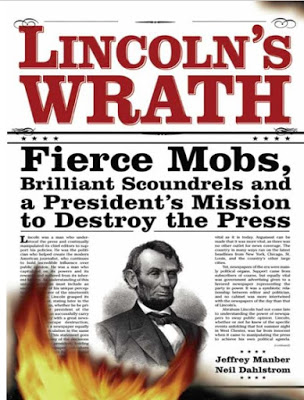
With Lincoln’s perception of the power of the press, it is little wonder that after being elected he carried out a systematic attack on the opposition press. The actual events of this attack on the free press, and other unconstitutional acts of the Lincoln administration, are detailed in the book Lincoln’s Wrath: Fierce Mobs, Brilliant Scoundrels and a President’s Mission to Destroy the Press by Jeffrey Manber and Neil Dahlstrom. The New York Herald on August 28, 1861 gave an accounting of the opposition newspapers that had experienced the consequences of being on the wrong side of the government’s policy.
Northern Papers destroyed by mob
Jeffersonian, West Chester, PA
Sentinel, Easton, PA
Farmer, Bridgeport, CT
Democrat, Canton, OH
Standard, Concord, NH
Democrat, Bangor, ME
Clinton Journal, KS
Northern secession papers suppressed by civil authority
Catholic Herald, Philadelphia, PA
Christian Observer, Philadelphia, PA
Northern secession papers died
Herald, Leavenworth, NJ
American, Trenton, NJ
Northern secession papers denied transportation in the mails
Journal of Commerce, NY
News, NY
Day Book, NY
Freeman’s Journal, NY
Secession papers changed to union
Eagle, Brooklyn, NY
Republican, St. Louis, MO
Democrat, Haverhill, MA
[End Quote]
Things were just getting started when this list was published in August 1861. So dependent upon the nation’s newspapers was the new administration, to gain and maintain public support for the war, that within the first month of Lincoln’s inauguration at least twenty newspaper editors had received appointments in the government.
The ministers to Rome, Portugal, Turkey, commissioner of patents, and at least eight postmaster positions were awarded as favors upon newspaper editors. Murat Halstead of the Cincinnati Gazette printed all of the names and their positions, what he called a “disgrace to journalism.”
[Source: Lincoln’s Wrath, Manber and Dahlstrom]
Violent and coercive measures similar to that witnessed during the American Revolution were once again employed during the Civil War to silence all dissent. The Civil War was never clearly demarcated between North and South as some have supposed. There were many people living in northern states who were not in favor of armed warfare against their brothers in the Southern states. Most newspapers at the time were aligned with political parties. Lincoln was a Republican, and most Republican publications did well during the Civil War years. However, the Democratic papers which were most prone to criticize Lincoln’s policies, suffered greatly.
The Jeffersonian was a newspaper in West Chester, Pennsylvania, a suburb of Philadelphia, owned and run by a man named John Hodgson. In the book Lincoln’s Wrath, the authors give a detailed account of Hodgson’s conflict with the Lincoln administration, the threats he received, and the resulting mob violence when he continued to publish articles critical of the government’s policies.
Guided by the moonlit sky, the lawless group of conspirators finally closed in on their destination: the small, two-story office building at 12 South High Street, the home of the prospering West Chester Jeffersonian…
Nearly as the courthouse clock struck midnight, according to newspaper accounts in West Chester and Philadelphia after the fact, the unidentified mob crashed through the front door of the building proudly owned by the Hodgson family and swarmed into the brick office building of West Chester’s only remaining Democratic newspaper. Quietly, and with little attention, the men quickly and systematically destroyed the press equipment and anything else they stumbled upon. They callously overturned office furniture – chairs, tables, and desks – and smashed the small wood and metal type blocks. So intent were the men on putting the newspaper out of circulation that they made the effort to destroy even the huge cylinder printing press, the paper’s very lifeblood. It is not easy to destroy a solid cast-iron press in the thick of night; whomever these men were, we can say they were strong and determined to shut down Hodgson for good.
They quickly climbed the narrow steps in the rear of the building, destroying the paper’s most vital business records as if dumping the foul-smelling refuse of a chamber pot into the alley below. Subscription lists were ripped into pieces and thrown through the shattered front window, the bundles catching on the jagged shards of glass that jutted from the wooden frame…
Such destruction is not a Christian act. It is Satan who comes to “kill, steal and destroy.” It says something about the nature of a government that will sanction such actions. No effort was ever made to rein in the mobs who repeated this scene across the Northern states. The government turned a blind eye, giving tacit approval to the silencing of all opposition voices.
The government’s involvement was not merely one of failing to act to protect the rights and property of its citizens. In the same month of April 1861 Lincoln suspended the privilege of the writ of habeas corpus.
The writ of habeas corpus guarantees the right of a citizen to be charged with a specific crime if arrested, a basic constitutional guarantee…
The chief justice of the Supreme Court, appalled at the extreme use of executive power, soon weighed in on the question. On May 27, 1861, eighty-four-year-old Chief Justice Roger Taney ruled that military arrest… violated the privilege of the writ of habeas corpus… Taney… wrote that the president “cannot suspend the privilege of the writ of habeas corpus, nor authorize any military officer to do so. Only Congress has that power…”
But Lincoln would not be pressured by the Chief Justice, and he ignored the ruling.
[Source: Ibid]
This was followed later that summer with one of many confiscation acts written by Congress and signed into law by Lincoln.
On August 6, 1861, President Lincoln signed S. 25, “An Act to Confiscate Property Used for Insurrectionary Purposes…”
Any persons engaged in supporting “the present or any future insurrection” by aiding and abetting the enemy in any form shall be open to the seizure of property used for that aim.
What it meant was that any Southern supporter in the North could face the loss of their property if it was used to help the Confederacy… Union Democrats feared that the administration would consider an anti-Lincoln newspaper to be a tool against the Union and hence, it could be confiscated. And not just the newspaper but the type, the press, the office, and all associated with it.
[Source: Ibid]
These were not idle worries. “Two days after the passage of the Confiscation Act, soldiers of the First New Hampshire sacked the Democratic Standard in Concord, Maine.” Then the courts got involved, signaling their agreement with the President and the Congress.
On August 15, 1861, a week after the signing of the Confiscation Act… the administration’s battle against the antiwar newspapers broadened to include the courts. A grand jury was convened in New York… to determine the legality of indicting Northern newspapers that openly opposed the war…
Each paper identified was now a target and was publicly warned to change their editorial tone or face the consequences… The government quickly used the event to begin seizing the newspapers named, and stopped their shipment through the mail.
On August 22, the newspapers named by the grand jury were suspended from the mail per order of the New York postmaster. As the papers arrived in Northern cities that day by train, the United States marshal for the Eastern District seized all copies. The legal justification was the War Department’s General Order No. 67, which ordered that all correspondence and communications, verbal or written, that put the “public safety” at risk, should be confiscated. The punishment for creating such correspondence and communications, according to the order, was death.
[Source: Ibid]
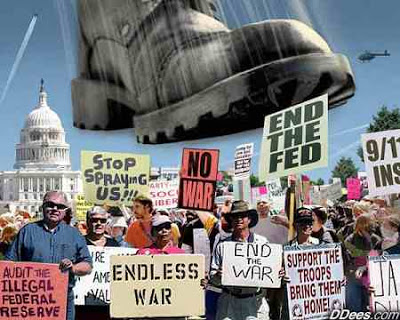
Not So Free Speech
Following the ransacking of Hodgson’s newspaper, he continued to write articles that he sent out for publication in other newspapers. That the mob violence done to his business was approved by the Lincoln administration was further evidenced when not many days later his building and all that was in it was seized by two United State’s marshal’s deputies.
They handed William a document. In part, it called for the deputies to “take, hold, and keep possession of the building, as well as all property of every kind whatsoever, used in and about the publication of said newspaper…”
The document handed to them revealed the takeover of the building and the suppression of the newspaper were being taken “upon the authority of the president of the United States.”
[Source: Ibid]
A wave of arrests now swept the nation as the Lincoln administration sought to silence all dissent. Especially targeted were any Americans who had the power to sway public opinion. These men were arrested, held without charges, and were granted no opportunity to defend themselves in court.
There was a structure in the harbor of Baltimore that brought to life the fears of the antiwar editors. Though conceived as a fort, it was transformed in the opening days of the Civil War into a prison – a place to house the men who opposed Lincoln and his war.
Rarely in American history have there been prisons like Fort McHenry in Baltimore and Fort Monroe in New York and a dozen more scattered through the Union. Through their gates passed the entire spectrum of American society of the 1860s, apparently united only in their ability to sway the voters to turn against the conduct of the war.
“Among the prisoners may be found representatives of every grade of society,” wrote the author of the 1863 pamphlet Bastilles of the North. “Governors of state, foreign ministers, members of Congress and of different state legislatures, mayors, police commissioners… doctors, civil, naval, and military… mechanics (especially machinists and inventors, whom the government regards as a dangerous class); editors of newspapers, religious and political…”
Those taken to prison were all the living embodiment of the power of the Confiscation Act. As explained by one prisoner, these men were referred to as “prisoners of state, a term happily hitherto unknown on this side of the Atlantic, the sound of which instinctively carries us to Italy and Austria, or the blackest period in the history of France…”
Overall, it is estimated that more than twelve thousand arrests of noncombatant citizens were made during the Civil War.
[Source: Ibid]
People of God, although this series main focus is to expose the level of deception that most Christians are operating under, and I have been focusing on some of the actual events of history to reveal how a false historical view of America as a Christian nation has been foisted upon the people and the notion that the United States was founded by fundamentalist Christians is untenable, I would digress a moment to share something I believe is immediately pertinent.
Much has been made of the similarities between Barack Obama and Abraham Lincoln. Both men were politicians from Illinois. Both had very short, and unremarkable experience in the Illinois State legislature before being elected President of the United States. Neither man would have been elected apart from the collusion of the media of their day. Barack Obama took his oath of office as President of the United States with his hand upon the same Bible used by Abraham Lincoln.
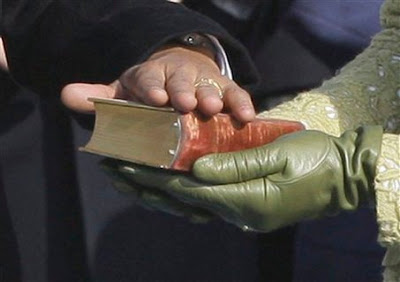
Barack Obama – Lincoln’s Bible
The parallels have continued since Barack Obama has been in office. Even as Lincoln vastly expanded the executive powers of the President, so too has Obama. Barack Obama has signed into Law the National Defense Authorization Act of 2012, and the National Defense Resources Preparedness Act. This latter Act in particular bears very real similarities to the Confiscation Act signed by Lincoln. Congresswoman Kay Granger from Texas sent out a letter to her constituents to alert them.
Dear Friend,
With all that is going in Washington these days some things don’t make the news the way they should. (This is evidence of media control.) Fourteen days ago President Obama issued an Executive Order that you should know about. This order gives an unprecedented level of authority to the President and the federal government to take over all the fundamental parts of our economy – in the name of national security – in times of national emergency.
This means all of our water resources, construction services and materials (steel, concrete, etc.), our civil transportation system, food and health resources, our energy supplies including oil and natural gas – even farm equipment – can be taken over by the President and his cabinet secretaries. The Government can also draft U.S. citizens into the military and force U.S. citizens to fulfill “labor requirements” for the purposes of “national defense.” There is not even any Congressional oversight, only briefings are required.
[Source: http://kaygranger.house.gov/weekly-enewsletter-executive-order-you-should-know-about]
Additionally, even as the Republicans took over both houses of Congress when Lincoln was elected, the Democrats took over both houses when Obama was swept into office. The 111th Congress began its session concurrently with Obama’s term as President. One of their first acts was to establish national detention centers on military bases all across the nation. The legislation can be read at the government’s website.
http://thomas.loc.gov/cgi-bin/query/z?c111:H.R.645:
This is a remarkable similarity to what I have just shared about Fort McHenry, Fort Monroe, and a dozen other similar detention centers established by the Lincoln administration. These former military bases were converted to be used as prison camps for prisoners of state. In these camps men were held without charge, and without trial, simply because the government perceived them as a threat to their policies.
Such preparations are not being made by the Obama administration and the Congress for no purpose. The Spirit has been testifying that a time of great political, economic, and civil unrest is coming to the nation. We will see in coming days that the ability to communicate any opposition perspective will be tightly suppressed. Already the government has enacted laws by which it might take control of the Internet in a time of national crisis. The mainstream media is owned by the elite, unseen, invisible government that is the true power. Free speech will be as repressed as it was in the days of Lincoln, and all it will take is one trigger event.
In Lincoln’s day that event was the capture of Fort Sumter in Charleston Harbor by the Confederate States. This led to an immediate suspension of Constitutional rights, and the enactment of draconian measures such as the suspension of the writ of habeas corpus and the passage of the Confiscation Act.
We should not think that such oppression is new to this nation. Twelve thousand people were arrested and imprisoned during the Civil War by the Union, citizens of their own Northern states, simply for disagreeing with the government’s policies. The coming days will be different only in scope. There will be far more arrested, imprisoned, and held without charge or legal recourse.
The parallels we are seeing at this time to what occurred under the Lincoln administration are not coincidental. Our Father would have His sons and daughters to make Him their refuge. It is a time to walk closely to the Father, to be surrendered to the direction of the Spirit. He will guide His elect through the perilous days ahead.
Much more could be shared about the need of an elite group to control the public opinion, and the methods they employ, and more is forthcoming. Yet, to keep this post from being excessive in length I will conclude this chapter here.


0 Comments